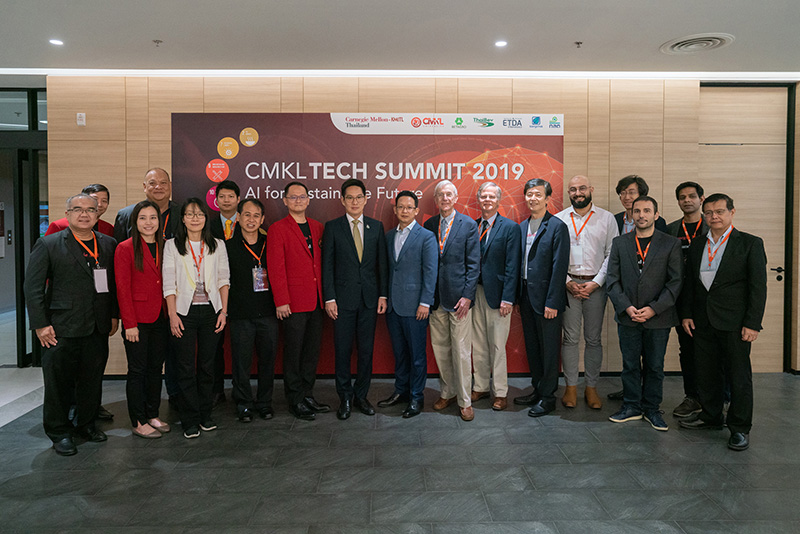CMKL Tech Summit 2019 on AI for a Sustainable Future
Dec 18, 2019
On December 16, 2019, CMKL University held its third tech summit in Bangkok, Thailand, on the topic of AI for a sustainable future. The summit aimed to help attendees, both corporate and individuals, learn how to use transformational technology to deal with current issues related to the United Nations Sustainable Development Goals.
The event gathered world-class experts from the private and educational sectors to share their knowledge and experience on AI for a sustainable future. Presenters explained new trends and updates on artificial intelligence, blockchain, and the internet of things and mixed reality, and worked to help people integrate these developments into their businesses and to discover how technology can be transferred between companies and academia.

Source: CMKL University
The event was kicked off with welcome remarks by Newin Chochaiyathip, Vice Minister of the Digital Economy and Society; Supan Tungjitkusolmun, President of CMKL University; and Surangkana Wayuparb, Executive Director and CEO of the Electronic Transactions Development Agency in Thailand.
Featured speakers included:
- José Moura, Philip L. and Marsha Dowd University Professor of Electrical and Computer Engineering at Carnegie Mellon University, who talked about AI and ML opportunities and challenges in urban science. Moura advised attendees to think globally while acting locally to have better management, better living, and happier people.
- Bruce Krogh, Professor Emeritus of Electrical and Computer Engineering at Carnegie Mellon University, who shared his knowledge on distributed control systems for resilient and sustainable infrastructure. Attendees learned how control theory can help with cyber uncertainties by building trust through monitoring and mitigation.
- Hae Young Noh, Associate Professor of Civil and Environmental Engineering at Carnegie Mellon University, who spoke about vehicles as sensors and about AI to understand change in infrastructure and transportation systems. Using vehicles’ on-board sensing systems helps diagnose damage on roads, railways, and bridges effectively and efficiently.
- Osman Yagan, Associate Research Professor of Electrical and Computer Engineering at Carnegie Mellon University, who discussed leveraging AI for responsible production and consumption. In order to accommodate population growth with the limited resources, we need to innovate in all human activities by leveraging automation and AI to do more with fewer resources.
- Javad Mohammadi, Special Faculty of Electrical and Computer Engineering at Carnegie Mellon University, discussed the future of how energy is distributed. The takeaways are: the grid’s structure is evolving; distributed affordable energy resources are reshaping energy delivery and generation; combating climate change requires a resilient energy network; and distributed decision-making is the key.
There were several panel discussions during the summit, including:
- Pei Zhang, Associate Research Professor of Electrical and Computer Engineering at Carnegie Mellon University, and Mr. Woranun Woramontri, senior specialist–corporate strategy of Betagro Group, discussed how sensing and AI can help in making healthy food available to consumers and how farmers and industry work together in sustaining food production and adopting new technology.
- Hyong Kim, Drew D. Perkins Professor of Electrical and Computer Engineering at Carnegie Mellon University, and Kaipichit Ruengsrichaiya, Director of Capital Market Data Management and Analytics Department at the Securities and Exchange Commission in Thailand, shared their vision on how to reduce inequality by providing economic accessibility to all with help of AI and blockchain.
- Soummya Kar, Associate Professor of Electrical and Computer Engineering at Carnegie Mellon University, and Mr. Korsak Towantakavanit, Manager of Ecosystem and Incubation of Bangchank Initiative and Innovation Center, discussed distributed stochastic optimization for large-scale inference and learning.
- Hyong Kim, Drew D. Perkins Professor of Electrical and Computer Engineering at Carnegie Mellon University, and Mr. Teerapan Luengnaruernitchai, Vice President, Office of Information Technology, of Thai Beverage PCL, talked about revitalizing global partnerships for sustainable development as well as the partnership between Carnegie Mellon University, CMKL University and Thai Beverage.
The event came to a successful close with a student poster session on research topics using AI.
